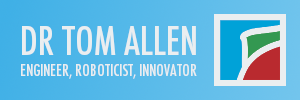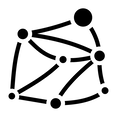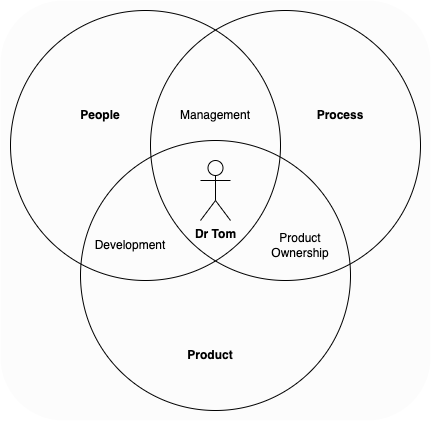Dr Tom Allen, Consultant CTO
|
I'm an experienced CTO and engineering leader who also understands business and can translate between both worlds. My speciality is working with engineering teams on mechatronic products - anything that combines software, electronics, and hardware. In today's world that typically means internet-of-things (IoT) products like smart sensors, wearable devices, and medical technologies.
|
But with a Ph.D. in autonomous robotics I'm also well versed in large-scale systems engineering, path planning, data science, machine-learning and AI. And with many years on the tools as a software engineer and architect myself, I'm also fluent in what it takes to launch a successful SaaS business in the modern cloud environment.
I have been a Chief Technology Officer of my own startup business (Cubescape) and more recently for a scale-up IoT business where I grew the engineering team and product suite over several years. I've been the software architect or lead engineer on numerous projects, and have long-standing relationships with trusted developers who are always keen to work with me again. Similarly I have built high-trust, high-value relationships with previous employers and clients, many of whom I've worked with on multiple occasions.
If you have an existing team, I can help you get the most out of them or grow the team to cover the skillsets you need. If you don't, I can leverage my network of developers to place key roles, or work with your recruiters to screen, interview, and engage a team that fits. Need an interim CTO right now? I can step into your existing project and get things moving on the right track.
I have been a Chief Technology Officer of my own startup business (Cubescape) and more recently for a scale-up IoT business where I grew the engineering team and product suite over several years. I've been the software architect or lead engineer on numerous projects, and have long-standing relationships with trusted developers who are always keen to work with me again. Similarly I have built high-trust, high-value relationships with previous employers and clients, many of whom I've worked with on multiple occasions.
If you have an existing team, I can help you get the most out of them or grow the team to cover the skillsets you need. If you don't, I can leverage my network of developers to place key roles, or work with your recruiters to screen, interview, and engage a team that fits. Need an interim CTO right now? I can step into your existing project and get things moving on the right track.
Tom’s outstanding communications skills allow him to speak with confidence and authority equally well to an office full of developers as to a boardroom full of executives. It is exceptionally difficult to find people of his calibre. There is little more I can say by way of recommendation than I have already sought him out for multiple roles over his career and hope to work with him again in the future. - Dr Eric Nettleton
I encourage you to explore this website to see the range of projects I've worked on, and read through my testimonials from previous clients about what it's like to work with me.
Benefits of working with me
|
Quality Software Architecture
I have a strong design sense and the experience to know where and when to make trade-offs. The wide range of projects I've been involved in gives me many different patterns to work with, and a strong set of starting points for greenfield developments. I know when to lock down a design choice and when it's better to spend some additional effort to leave options open. And through years of mentoring and coaching, I also know how to teach this aesthetic sense to others, and to explain my designs and approaches to colleagues. Deep Technical Knowledge
I have degrees in Engineering, Physics, and Robotics, along with real-world experience in multiple industries. That breadth lets me know where to start with any problem I might encounter, but my depth of knowledge of software development, architecture, and team management gives me the confidence that my solutions will stand the test of time. There's a good chance I've worked with the language, technology, or design pattern you're using, and if not, I've likely worked with the foundational ideas behind it and can get to grips with it quickly enough to be effective. I can also help you choose the right technology stack for today and for the future, or guide you in making a decision to change. Executive and Board Experience
For most of the latter half of my career I've worked closely with C-suite executives (or as one) and their boards of directors. I've prepared and led board presentations and am comfortable offering direct and blunt feedback when necessary. I have a good understanding of financial considerations and the typical business models encountered in engineering startups, and can express engineering concerns in the right level of detail or brevity for the situation. Outside of work commitments I also sit on the boards of Kids Like Us, a not-for-profit social enterprise that helps gifted young people who also struggle with a disability or learning disorder, and my own business, Cubescape. |
Innovative Solutions
If a Ph.D. gives you the skills to learn anything you need to know (even if it hasn't been discovered before!), then founding a startup gives you the skills to find solutions to whatever problems come your way. But I couple this with a recognition that this isn't academic research, so there's a job to be done or a product to be sold. Innovation for its own sake isn't helpful to your business, but if you have an intractable problem that needs an out-of-the-box solution, my skills in ideation, fostering brainstorming sessions, and field-testing innovative solutions will be invaluable. Business Minded
While I'm a strong advocate for giving engineers the space they need to ideate and come up with creative solutions, I'm also aware you have a business to run and deadlines to hit. I've been the CTO in situations where competitors were better funded and starting from a better platform, and where the sales opportunities were on a strict deadline and were true make-or-break situations for the business. Those are the moments where your engineering team needs to trust that the leadership direction is well considered, and that if corners need to be cut or hard trade-offs must be made, that it's the right choice for the business. But by the same token, it's also where company management needs to be able to trust the engineering team when they say things can't be done, and you need someone who can explain the trade-offs and make recommendations that are in the best interests of the whole business, not just the engineering team. Clear Communication
Many engineers are fantastic problem solvers, yet can't express their solutions to other engineers, let alone actual humans. Not only can I translate engineer-speak into regular English, I can also write it down so that others can benefit from it in the future. I believe a strong wiki is a cornerstone of a successful engineering organisation, and I'm willing and able to do the hard yards to write documentation for everything that needs to live for posterity. I also recognise that having others contribute to that knowledge-sharing requires a strong cultural buy-in, and if I have the right relationship with the rest of your organisation, I can help drive that too. |
Lasting Partnerships
My first role upon moving to Melbourne was with a consulting firm whose entire brand was predicated on getting to 'trusted partner' status with clients. Years later I still work with many of those colleagues, and I even founded a business with some of them. I've worked repeatedly with people I worked with back in academia two decades ago, or across different fields of industry, and at both startups and major corporations. I've placed developers I've worked with previously into roles with my own employers and with ex-colleagues I respect. I see every new client as an opportunity to extend that network and build a long-term relationship that can cross multiple business opportunities. Strong Networks
As an engineer myself I've worked with hundreds of developers and I've made a point to stay in touch with those I can trust and respect. As a manager this proved invaluable in finding short-term and permanent staffing, especially for some of the niche skillsets that are needed for complex mechatronic product development. I've also worked for or with a range of product development and software consultancies, and can make the right recommendations and introductions for the specific needs of your business. I've worked with overseas developers and remote/hybrid teams and can help to establish working patterns and IT infrastructure to facilitate this too. Honest Negotiation
I've read enough contracts and negotiated enough MOUs, LOIs, and other TLAs to have a good grasp of what's required to emerge on the other side with the minimum of lawyers involved. My negotiation strategy is always to engage honestly and openly. If that strategy opens me up to exploitation in the short-term that's a cost I'll bear to avoid long-term engagements that aren't based on trust. Whether or not your business wants me negotiating on your behalf, you'll nonetheless appreciate my approach here as we work out how best to work together. |
Frequently Asked Questions
Can You show me a model for how you work?
People, Process, & Product are the core components of technical management. In larger corporations each facet is a role or discipline by itself, but in smaller businesses or startups you'll need leadership that can span all three. Competency and experience in all these areas is a rare combination that's hard to hire, but if you need additional expertise in any single area, that's a far easier hole to fill.
I improve business outcomes for engineering organisations by focussing on the intersections between these disciplines; Management, Development, and Product Ownership. Each of these intersections is a role in itself, and I've been a people manager, a lead developer, and product owner across my career. Now as a consultant I bring my experience in each to help your organisation with challenges in any and all of these areas, and also to advise you on when to bring in a full-time CTO with the skillset to handle all of them, or dedicated practitioners for just a few.
A typical engagement with me would start with a face-to-face meeting or video call to discuss your organisation and the biggest challenges you face. That might require follow-up calls or I may need to meet with other people in the business to get other sides of the story. Once I've got a good feel for where I'm needed and what I can do, I'll put together a project proposal with a few options, either with a fixed fee based on the value delivered or a daily rate and a commitment of X days per week. If we're a good fit for each other, you may wish to switch to a retained services model that gives me some certainty of income, and gives your team someone they can call on whenever problems arise rather than negotiating a new scope of work each time.
I improve business outcomes for engineering organisations by focussing on the intersections between these disciplines; Management, Development, and Product Ownership. Each of these intersections is a role in itself, and I've been a people manager, a lead developer, and product owner across my career. Now as a consultant I bring my experience in each to help your organisation with challenges in any and all of these areas, and also to advise you on when to bring in a full-time CTO with the skillset to handle all of them, or dedicated practitioners for just a few.
A typical engagement with me would start with a face-to-face meeting or video call to discuss your organisation and the biggest challenges you face. That might require follow-up calls or I may need to meet with other people in the business to get other sides of the story. Once I've got a good feel for where I'm needed and what I can do, I'll put together a project proposal with a few options, either with a fixed fee based on the value delivered or a daily rate and a commitment of X days per week. If we're a good fit for each other, you may wish to switch to a retained services model that gives me some certainty of income, and gives your team someone they can call on whenever problems arise rather than negotiating a new scope of work each time.
Are you available to be our full-time CTO?
No. My working life is a portfolio of projects and opportunities at any given time, some of which are obligations I can't easily unwind, and others that are big parts of what I value in life and don't want to give up. My ability to successfully juggle all these responsibilities is proof that I'm good at project management and prioritisation. In general, if my slate is clear of other clients I'm able to devote up to four days per week to your business. In a lot of cases that can be more than enough to make a difference.
In my experience, many startups don't actually need a full-time CTO in the early stages. You may well want full-time people management, but once a technology strategy is in place and well understood, a CTO could be under-utilised until you achieve a level of scale that requires changes to the team structure or culture of the organisation. I can help you identify the point at which you need full-time technical leadership, and the specific skills your business requires of them. At that point I can also help you find the right person.
Incidentally, a lot of businesses dream of getting someone who can be both their CTO and also write software much of the time. In my humble experience, this is a naïve hope. If a CTO is really needed, they're going to be busy, and they're going to be on the manager's schedule, not the maker's. With that many interruptions and different considerations going on simultaneously, they're not going to be writing great software. And if they are writing any software that's a critical part of your product, then they become both a dependency and a risk. Of course someone who spruiks part-time CTO consulting services would say this, but you're probably better off investing in a brilliant full-time developer and then contracting in someone else to guide technical strategy and review the design and development periodically as it proceeds.
In my experience, many startups don't actually need a full-time CTO in the early stages. You may well want full-time people management, but once a technology strategy is in place and well understood, a CTO could be under-utilised until you achieve a level of scale that requires changes to the team structure or culture of the organisation. I can help you identify the point at which you need full-time technical leadership, and the specific skills your business requires of them. At that point I can also help you find the right person.
Incidentally, a lot of businesses dream of getting someone who can be both their CTO and also write software much of the time. In my humble experience, this is a naïve hope. If a CTO is really needed, they're going to be busy, and they're going to be on the manager's schedule, not the maker's. With that many interruptions and different considerations going on simultaneously, they're not going to be writing great software. And if they are writing any software that's a critical part of your product, then they become both a dependency and a risk. Of course someone who spruiks part-time CTO consulting services would say this, but you're probably better off investing in a brilliant full-time developer and then contracting in someone else to guide technical strategy and review the design and development periodically as it proceeds.
Can you write our software for us?
Perhaps, but generally not. The types of projects I get involved with are usually too much software for one person to handle, and I don't want to become a bottleneck on your operations when my availability is less than full-time. If software development is the primary skill you're after, then chances are that I can help you find better developers than me, at a cheaper rate too.
That said, my key software strengths are in Python for embedded and application development, and algorithm design and prototyping. I'm much more keen on building a proof-of-concept or tech demo than polishing software to a customer-ready state. I've done that on multiple occasions and then handed over to an existing or newly formed team to extend or rewrite into a fully fledged product.
As many startups will attest, there's the potential for a lot of pain in transforming academic code or a technical demo into a real software product. But that transition has been the heart of my career for over a decade, and I enjoy working with other developers to strengthen my ideas into the solid foundation for a successful product.
That said, my key software strengths are in Python for embedded and application development, and algorithm design and prototyping. I'm much more keen on building a proof-of-concept or tech demo than polishing software to a customer-ready state. I've done that on multiple occasions and then handed over to an existing or newly formed team to extend or rewrite into a fully fledged product.
As many startups will attest, there's the potential for a lot of pain in transforming academic code or a technical demo into a real software product. But that transition has been the heart of my career for over a decade, and I enjoy working with other developers to strengthen my ideas into the solid foundation for a successful product.
How Do you get paid?
I provide consulting services as an independent contractor. I hold infotech liability insurances (professional indemnity and broadform liability) and provide my own standard tools. You engage me on either a daily rate, a project basis, or a retained basis. Projects have fixed fees paid regularly or at milestones, and the structure is based on achieving objectives that we agree upon in advance. A retainer allows you unlimited access to me for advice or consultation by the relevant people in your organisation.
My rates for projects or retained services are lower than what I charge on a daily basis, as it's better for both of us if there's a continuity of service. Most of my clients start out on a daily rate and we switch to a project or retained basis once we're comfortable working together and have a better idea of what will be involved and what the outcomes will look like.
My rates for projects or retained services are lower than what I charge on a daily basis, as it's better for both of us if there's a continuity of service. Most of my clients start out on a daily rate and we switch to a project or retained basis once we're comfortable working together and have a better idea of what will be involved and what the outcomes will look like.
We need an INTERIM CTO fast - can you step in?
Yes! I've had several 'rescue mission' experiences where key staff have left suddenly or significant issues have only just become visible. In my view the vital responses are to set expectations about what's possible and what it might take, and then to assess the problems using a risk vs impact approach. I will quickly evaluate the situation, triage and prioritise the responses required, and then work with the remaining team to get people, process, and product back in order. With the critical fires put out, I can then work with you and your team to bring on a full-time CTO and other necessary roles.
Iconography on this page by Delapouite, Lorc and Skoll, available on game-icons.net under CC BY 3.0










